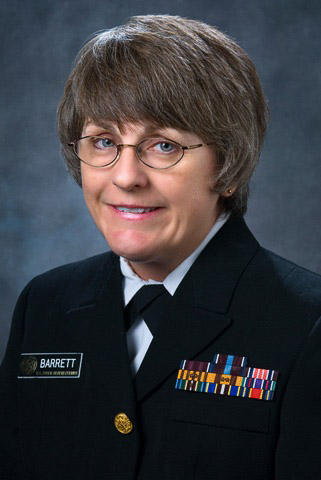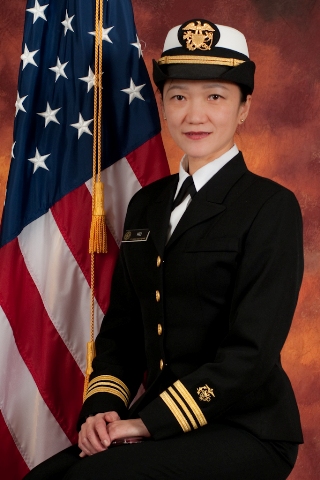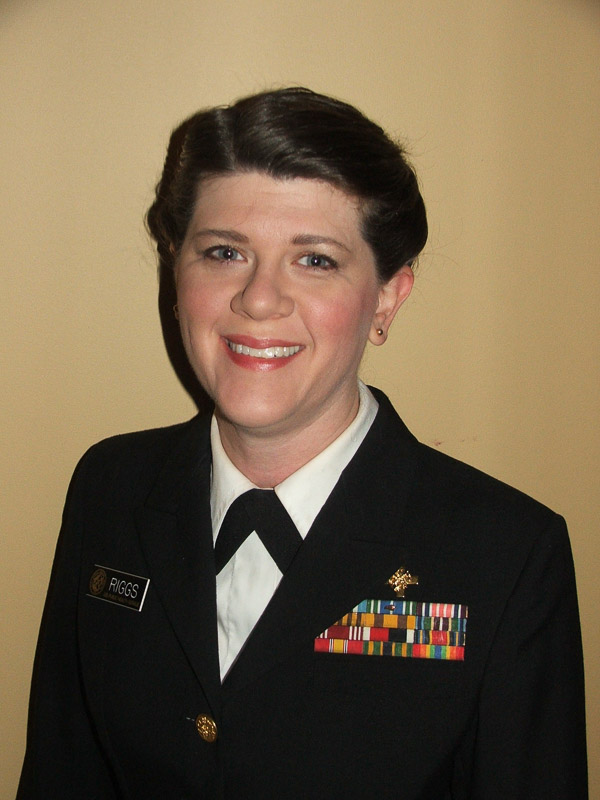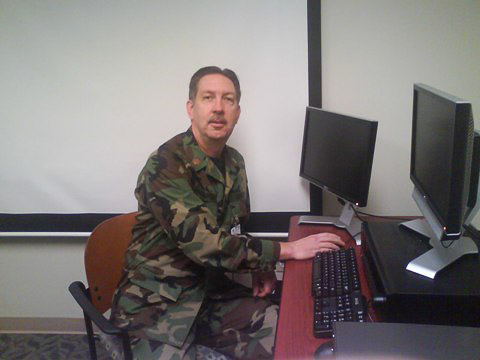2008 Derek Dunn Memorial Senior Scientist Officer of the Year
CAPT Drue Barrett
 Captain Barrett has meritoriously represented the Public Health Service (PHS) through leadership in a number of scientific undertakings. Since June 2006, CAPT Drue Barrett Chaired the CDC Public Health Ethics Committee and was the Designated Federal Officer for the Ethics Subcommittee of the Advisory Committee to the Director, CDC. CAPT Barrett provided training for CDC responders on ethical aspects of pandemic influenza preparedness and response including all of CDC’s major partners in state and local health departments. Other notable achievements include: 1) responding to the New York City health department to assess the health needs of residents living near the World Trade Center site (“Ground Zero”) following the 9/11 terrorist event; 2) editing the Department of Veterans Affairs Annual Report to Congress on Gulf War Veterans Research; 3) negotiating research collaborations related to Agent Orange exposure as part of the U.S. delegations to Vietnam, and 4) collaborating with Saudi Arabian officials on a 1991 Gulf War research study.
Captain Barrett has meritoriously represented the Public Health Service (PHS) through leadership in a number of scientific undertakings. Since June 2006, CAPT Drue Barrett Chaired the CDC Public Health Ethics Committee and was the Designated Federal Officer for the Ethics Subcommittee of the Advisory Committee to the Director, CDC. CAPT Barrett provided training for CDC responders on ethical aspects of pandemic influenza preparedness and response including all of CDC’s major partners in state and local health departments. Other notable achievements include: 1) responding to the New York City health department to assess the health needs of residents living near the World Trade Center site (“Ground Zero”) following the 9/11 terrorist event; 2) editing the Department of Veterans Affairs Annual Report to Congress on Gulf War Veterans Research; 3) negotiating research collaborations related to Agent Orange exposure as part of the U.S. delegations to Vietnam, and 4) collaborating with Saudi Arabian officials on a 1991 Gulf War research study.
2008 Junior Scientist Officer of the Year
(Two winners this year!)
Recipient 1: LCDR Sally Hu
 LCDR Sally Hu is a Technology Licensing Specialist in the National Institute of Health’s (NIH) Office of Technology Transfer (OTT), responsible for patent and license activities related to HIV. LCDR Hu utilizes her strong professional knowledge and skills in science and business as well as her bilingual skills (English and Chinese) to promote the dissemination of HIV therapeutic technologies around the world. Her activities in this area also include volunteering her personal time above and beyond the call of duty to combat AIDS and improve the global public health. Specific activities LCDR Hu is recognized for include: 1) devising and incorporating a special language in her license agreements with drug developers to oblige receiving licenses from the NIH to distribute drugs in developing countries and 2) negotiating and executing a license agreement under which a new anti-HIV (Prezista®) drug was developed, an antiretroviral (ARV) drug that inhibits the replication of HIV for the treatment in patients who are non-responsive to existing anti-HIV therapies.
LCDR Sally Hu is a Technology Licensing Specialist in the National Institute of Health’s (NIH) Office of Technology Transfer (OTT), responsible for patent and license activities related to HIV. LCDR Hu utilizes her strong professional knowledge and skills in science and business as well as her bilingual skills (English and Chinese) to promote the dissemination of HIV therapeutic technologies around the world. Her activities in this area also include volunteering her personal time above and beyond the call of duty to combat AIDS and improve the global public health. Specific activities LCDR Hu is recognized for include: 1) devising and incorporating a special language in her license agreements with drug developers to oblige receiving licenses from the NIH to distribute drugs in developing countries and 2) negotiating and executing a license agreement under which a new anti-HIV (Prezista®) drug was developed, an antiretroviral (ARV) drug that inhibits the replication of HIV for the treatment in patients who are non-responsive to existing anti-HIV therapies.
2008 Junior Scientist Officer of the Year
Recipient 2: LCDR Margaret Riggs
 In her short time as a Commissioned Corps Officer, LCDR Riggs has made significant contributions to the PHS through her scientific work and field deployments. She successfully completed all of the requirements for the Epidemic Intelligence Service (EIS) while assigned to the National Institute for Occupational Safety and Health (NIOSH) at the CDC, gaining experience and training in Epidemiology, and in Environmental and Occupational Health. LCDR Riggs published a manuscript describing characteristics of flood-damaged homes in New Orleans and made recommendations for improved protection during cleanup. She was invited to co-author an MMWR article on mold and respiratory health effects in New Orleans after the 2005 hurricanes and co-authored four articles on the hurricane disaster in New Orleans, assessing the airborne levels of mold, health effects and the knowledge of residents participating in cleanup. Her work was presented at two national conferences in 2006 to advance the scientific knowledge of mold prevention strategies in order to reduce possible health effects in the aftermath of major floods.
In her short time as a Commissioned Corps Officer, LCDR Riggs has made significant contributions to the PHS through her scientific work and field deployments. She successfully completed all of the requirements for the Epidemic Intelligence Service (EIS) while assigned to the National Institute for Occupational Safety and Health (NIOSH) at the CDC, gaining experience and training in Epidemiology, and in Environmental and Occupational Health. LCDR Riggs published a manuscript describing characteristics of flood-damaged homes in New Orleans and made recommendations for improved protection during cleanup. She was invited to co-author an MMWR article on mold and respiratory health effects in New Orleans after the 2005 hurricanes and co-authored four articles on the hurricane disaster in New Orleans, assessing the airborne levels of mold, health effects and the knowledge of residents participating in cleanup. Her work was presented at two national conferences in 2006 to advance the scientific knowledge of mold prevention strategies in order to reduce possible health effects in the aftermath of major floods.
2008 Scientist Responder of the Year
LCDR David Thompson
 LCDR Thompson volunteered for and was selected to the second Tier Two Mental Health Team deployed to the Colville Indian Reservation from October 1-15, 2006. The team was deployed upon request of the tribe to provide assistance regarding the high number of recent suicides (20 times the national average). During this deployment, he was instrumental in setting a positive tone with the tribe and the community for the several Tier II Mental Health Teams deploying after them. LCDR Thompson did this by respectful and expert consultation with the Tribal Council, Behavioral Health Department, Tribal Health Department, Community Centers, and IHS Clinics. He provided clinical services to children and adults at schools, Behavioral Health Clinics, and Community Centers. He provided consultative clinical supervision to Behavioral Health staff and two tribal schools. LCDR Thompson also used his expertise in correctional environments and suicide prevention training to train staff at the Tribal Jail. LCDR Thompson maintains a high level of readiness and training through his roles on the Southeast Regional Crisis Support Team and the Tier Two Mental Health Team. His deployments to Katrina and the Colville mission provided invaluable experience making him an excellent candidate for Scientist Responder of the Year.
LCDR Thompson volunteered for and was selected to the second Tier Two Mental Health Team deployed to the Colville Indian Reservation from October 1-15, 2006. The team was deployed upon request of the tribe to provide assistance regarding the high number of recent suicides (20 times the national average). During this deployment, he was instrumental in setting a positive tone with the tribe and the community for the several Tier II Mental Health Teams deploying after them. LCDR Thompson did this by respectful and expert consultation with the Tribal Council, Behavioral Health Department, Tribal Health Department, Community Centers, and IHS Clinics. He provided clinical services to children and adults at schools, Behavioral Health Clinics, and Community Centers. He provided consultative clinical supervision to Behavioral Health staff and two tribal schools. LCDR Thompson also used his expertise in correctional environments and suicide prevention training to train staff at the Tribal Jail. LCDR Thompson maintains a high level of readiness and training through his roles on the Southeast Regional Crisis Support Team and the Tier Two Mental Health Team. His deployments to Katrina and the Colville mission provided invaluable experience making him an excellent candidate for Scientist Responder of the Year.
Page Last Modified on 1/9/2025